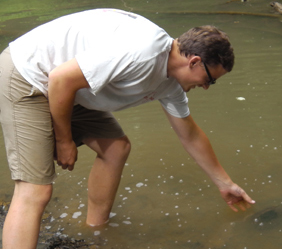Category: People
Dr. Ethan J. Kessler

Dr. Kessler then remained in the lab to begin as a postdoctoral researcher, where he began work on numerous projects. He has continued the Alligator Snapping Turtle reintroduction project for the Illinois Department of Natural Resources. He has since expanded his research repertoire to include eDNA sampling methods. Currently, Dr. Kessler has ongoing eDNA projects covering the Alligator Snapping Turtle, Mudpuppy, and Salamander Mussel.



